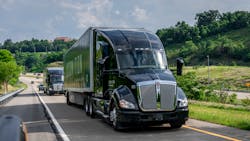Rise of the robo-fleet? 76% of shippers would consider autonomous trucks
A survey of 50 shippers conducted by freight broker Uber Freight found that the overwhelming majority of shippers are open to a future that includes autonomous trucks. According to Uber Freight, three out of four shippers (76%) are "extremely likely or somewhat likely to consider an autonomous freight solution in the future."
Other relevant findings include:
- Shippers most anticipate reduced costs and better reliability with the adoption of AVs, but are concerned about safety and reliability and liability for accidents.
- 50% of shippers are willing to pay more for autonomous trucks.
- 88% of shippers are willing to use digital documentation (digital BOL/POD) to facilitate AV incorporation.
- 86% of shippers are willing to incorporate drop trailer capabilities to accommodate AVs.
Rise of the robot trucks
One major reason for the embrace of robotic haulers is the inability to find human drivers. The industry is currently short about 80,000 drivers, and that could double to 160,000 by 2030, according to the American Trucking Associations. And available drivers are often wasted by waiting outside of ports for several hours, often without pay or nearby restrooms. Self-driving trucks require neither.
Various fleets and freight companies have already begun developing and testing autonomous vehicle (AV) capabilities for the commercial vehicle industry, including Waymo Via, Kodiak Robotics, and Embark Trucks. Over the past month alone, Waymo is testing their autonomous truck platform for the Freightliner Cascadia on the roads between Dallas and Houston. These tests executed more than 1,500 functional programming requirements including redundant power, braking, and steering to make the platform road ready.
Autonomous trucking company Locomotion also has an eight-year agreement with Stevens Trucking to deploy up to 500 truck equipped with Locomotion's Autonomous Relay Convoy (ARC) systems. The lead truck is driven by a person, while the following truck is remotely tethered and requires no driver. A driver will still be in the truck and can sleep and replace the lead driver when Hours of Service demands calls for a break. The trucks can operate up to 20 hours a day using this system, the company said.
Meanwhile, other companies are preparing the rest of the world for AVs as well. Pilot Flying J recently announced a partnership with Kodiak Robotics to allow their truck stops the capability to serve AVs as well as human-driven vehicles, starting with a location in Atlanta. Additionally, Embark held its first public demonstration of its AVs’ ability to interact with law enforcement safely and efficiently, with no hazards or additional training required for the officer that performed the stop.




